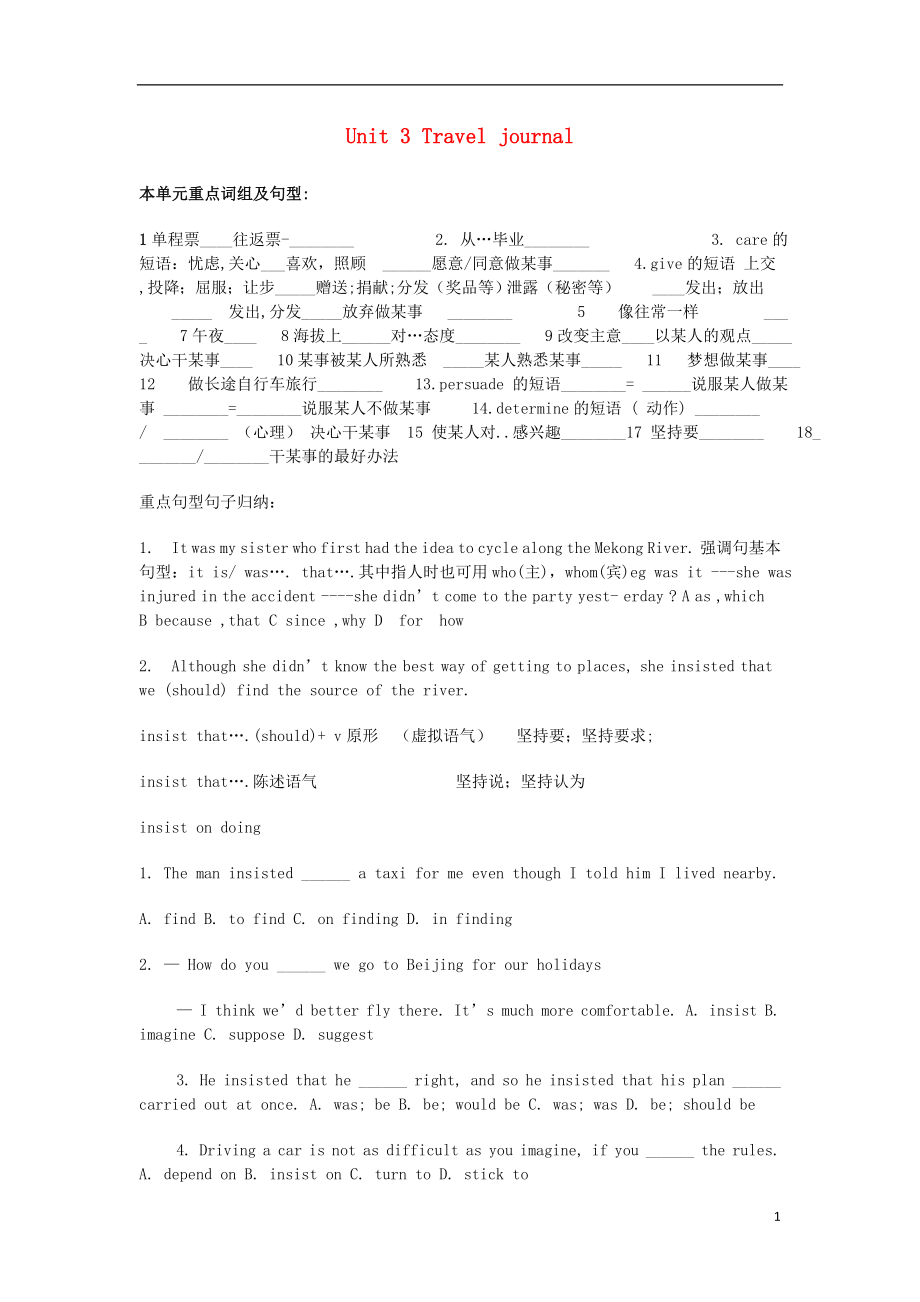《遼寧省北票市高中英語(yǔ) Unit 3 Travel journal學(xué)案1(無(wú)答案)新人教版必修1》由會(huì)員分享,可在線閱讀,更多相關(guān)《遼寧省北票市高中英語(yǔ) Unit 3 Travel journal學(xué)案1(無(wú)答案)新人教版必修1(2頁(yè)珍藏版)》請(qǐng)?jiān)谘b配圖網(wǎng)上搜索�����。
1����、
Unit 3 Travel journal
本單元重點(diǎn)詞組及句型:
1單程票____往返票-________?? ?2. 從…畢業(yè)________ ?3. care的短語(yǔ):憂慮,關(guān)心___喜歡����,照顧?______愿意/同意做某事_______ 4.give的短語(yǔ) 上交?,投降��;屈服����;讓步_____贈(zèng)送;捐獻(xiàn);分發(fā)(獎(jiǎng)品等)泄露(秘密等)??____發(fā)出;放出???_____?發(fā)出,分發(fā)_____放棄做某事 ?________?? ?5??像往常一樣????____ ? 7午夜____ 8海拔上______對(duì)…態(tài)度________ ?9改變主意__
2���、__以某人的觀點(diǎn)_____決心干某事____ 10某事被某人所熟悉?_____某人熟悉某事_____ 11? 夢(mèng)想做某事____ 12??做長(zhǎng)途自行車旅行________ 13.persuade 的短語(yǔ)________= ______說服某人做某事 ________=________說服某人不做某事 14.determine的短語(yǔ) ( 動(dòng)作) ________? /?________ (心理) 決心干某事 15 使某人對(duì)..感興趣________17 堅(jiān)持要________ 18________/________干某事的最好辦法
重點(diǎn)句型句子歸納:
1.
3���、?It was my sister who first had the idea to cycle along the Mekong River. 強(qiáng)調(diào)句基本句型:it is/ was…. that….其中指人時(shí)也可用who(主),whom(賓)eg was it ---she was injured in the accident ----she didn’t come to the party yest- erday ? A as ,which B because ,that C since ,why D for how
2.?Although she didn’t know t
4�、he best way of getting to places, she insisted that we (should) find the source of the river.
insist that….(should)+ v原形?(虛擬語(yǔ)氣)? 堅(jiān)持要��;堅(jiān)持要求;
insist that….陳述語(yǔ)氣???????? 堅(jiān)持說����;堅(jiān)持認(rèn)為
insist on doing
1. The man insisted ______ a taxi for me even though I told him I lived nearby.
A. find B. to find C.
5���、on finding D. in finding
2. — How do you ______ we go to Beijing for our holidays
— I think we’d better fly there. It’s much more comfortable. A. insist B. imagine C. suppose D. suggest
3. He insisted that he ______ right, and so he insisted that his plan ______ carried out at once. A. was; be
6�、B. be; would be C. was; was D. be; should be
4. Driving a car is not as difficult as you imagine, if you ______ the rules. A. depend on B. insist on C. turn to D. stick to
5. I wanted to pay by cheque but the landlord ______ that I pay him in cash. A. thought B. insisted C. ordered D. demanded
7、
3. 主語(yǔ)+ be +adj.+不定式”結(jié)構(gòu)�,其中主語(yǔ)是不定式的邏輯賓語(yǔ),不定式不用被動(dòng)語(yǔ)態(tài) eg. The question is impossible to answer.The problem is really hard to solve
這個(gè)問題不可能回答���。The days______we spent together on the farm are not easy______.
A.when;to forgetB.which;to be forgotten C.that;to forget
D./;to be forgotten
4.once引導(dǎo)條件和時(shí)間
8、狀語(yǔ)從句:(1)once引導(dǎo)條件狀語(yǔ)從句,意為“一旦……”,也可引導(dǎo)時(shí)間狀語(yǔ)從句,表示“一……就……”,相當(dāng)于as soon as���。(2)once作為連接詞引導(dǎo)條件狀語(yǔ)從句時(shí),后面可接現(xiàn)在分詞,與主語(yǔ)是主動(dòng)關(guān)系��;過去分詞與主語(yǔ)是被動(dòng)關(guān)系���。
(3)在once引導(dǎo)的從句中,要用一般時(shí)態(tài)代替將來時(shí)態(tài)����。
單項(xiàng)填空
(1)The research is so designed that once_____nothing can be done to change it.
A.beginsB.having begunC.beginningsD.begun
2)I am afraid
9���、I won’t have any influence over my 19-year-old daughter_______her mind is made up.
A.once??????????? B.the moment C.as soon as??????? D.since
三�、本單元語(yǔ)法詳解(現(xiàn)在進(jìn)行時(shí))
1.現(xiàn)在進(jìn)行時(shí)表示說話時(shí)正在進(jìn)行的一個(gè)動(dòng)作或用來描述一個(gè)頻繁發(fā)生的動(dòng)作�。例如:
Jeanne is sitting in the park.
Man is fighting a battle against population.
2.在時(shí)間、條件等狀語(yǔ)從
10�、句中用進(jìn)行時(shí)代替將來時(shí)。
If I am sleeping when he comes,wake me up,please.
3.有時(shí)可用來代替一般現(xiàn)在時(shí)來表達(dá)說話人的某種感情,常與continually always,constantly,forever連用����。
You are always forgetting the important thing.
You are always saying that.
He is constantly thinking of how he could do more for others.
4.現(xiàn)在進(jìn)行時(shí)除表示正在進(jìn)行的動(dòng)作
11、外�����,還可表示即將發(fā)生的動(dòng)作�,謂語(yǔ)動(dòng)詞通常為瞬間動(dòng)詞��。如:come,go,arrive,leave,start,return,stay,meet,get等���。這些動(dòng)詞的進(jìn)行時(shí)句子不能再接具體的時(shí)間。
eg. (1)—Will you tell us something about the weather there?
—I_____to that.
A.go B.comeC.am going D.am coming
(2) A new cinema_____here.They hope to finish it next month.
A.will be builtB.is builtC.has been builtD.is being built
2
 遼寧省北票市高中英語(yǔ) Unit 3 Travel journal學(xué)案1(無(wú)答案)新人教版必修1
遼寧省北票市高中英語(yǔ) Unit 3 Travel journal學(xué)案1(無(wú)答案)新人教版必修1

